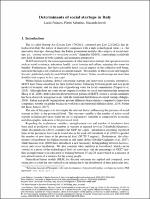Chapter Determinants of social startups in Italy
Author(s)
Palazzo, Lucio
Sabatino, Pietro
Ievoli, Riccardo
Language
EnglishAbstract
The so called "Startup Act" (Decree Law 179/2012, converted into Law 221/2012), has introduced in Italy the notion of innovative companies with a high technological value, denoted as the innovative startups. Among them, the Italian government includes the category of SIAVS ("Startup Innovative A Vocazione Sociale"), which represents a relatively new field of interest in both scientific and normative perspective. A social startup must satisfy the same requirement of other innovative startups, usually operating in sectors such as social assistance, education, health, social tourism and culture which can have a direct (social) impact on collective well-being. Furthermore, they must produce specific reporting of the produced social impact, enjoying also some tax benefits. In 2020 more than 200 SIAVS are registered in Italy, more than doubled with respect to 2015. This work is concerned with the empirical analysis of innovative companies focused in funding and implementing solutions to social, cultural, or environmental issues. Specifically, the aim of the paper is to investigate what are the relevant factors for the arise of SIAVS in Italy. The response variable is based on the number of active social startups in Italian provinces while the set of explanatory variables is composed by economic and demographic indicators at the provincial level. Generalized linear models (GLM) for discrete outcomes are applied and compared, even taking into account the zero-inflated issue arising due to the distribution of these particular data.


 Download
Download Web Shop
Web Shop